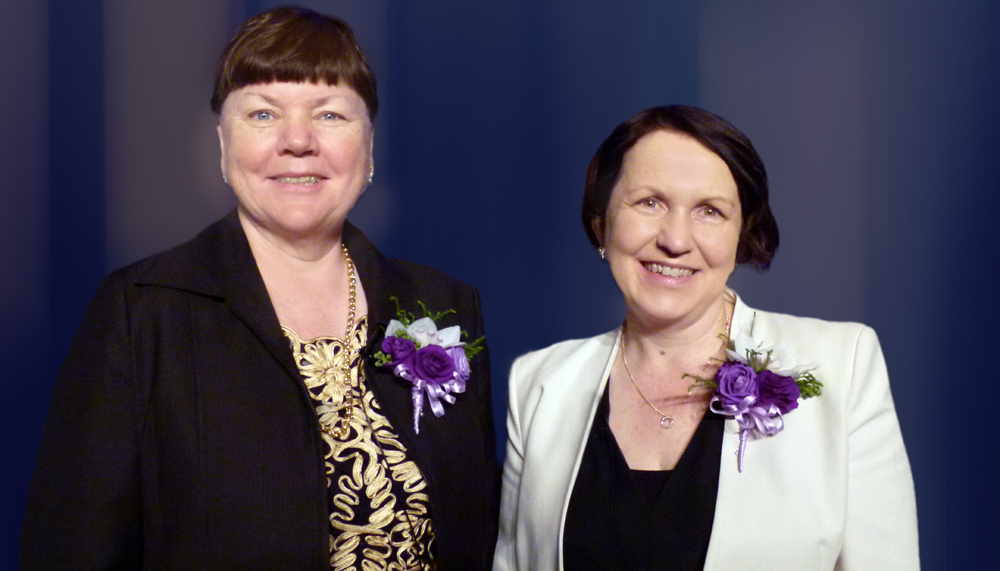Paragons of enquiry

Two Australian nursing researchers receive global honour for the widespread impact of their work.
Two revered Queensland-based nursing researchers have received international recognition for the impact their work has had on the profession.
Patsy Yates and Mary Courtney have been selected to receive the International Nurse Researcher Hall of Fame Award.
Yates, head of the School of Nursing and director of the Centre for Palliative Care Research and Education at Queensland University of Technology, was recognised for her key scientific advances in the field of cancer and palliative care nursing.
Award organiser the Sigma Theta Tau International Honor Society of Nursing (STTI) states that her commitment to the field has “resulted in widespread benefits for patients and families, the profession and policymakers”.
Fellow researcher professor Mary Courtney, head of the School of Nursing, Midwifery and Paramedicine at Australian Catholic University, also made the list of honourees.
STTI describes her major contributions to the nursing profession as “advancing nursing knowledge in in-home assessment, telephone case management, discharge planning, transitional care, and prevention of hospital readmissions in vulnerable population groups”.
Yates and Courtney, who both recently attended the awards ceremony in Hong Kong, spoke to Nursing Review about their careers in research – and shared advice for those looking to pursue nursing research.
NR: What were your reactions to being named honourees, and what does this type of recognition mean to you?
Patsy Yates: It was a great honour to be recognised for the contribution that nursing research in Australia is making internationally, and I think it is an acknowledgement that the quality and impact of our research is of an international standing.
Personally, it was a great [reminder] that, as researchers, we need to continue to provide leadership in Australia and it has given me more commitment and enthusiasm to continue to provide that effort.
Mary Courtney: I was somewhat stunned! I am grateful and thankful for having worked with some exceptional researchers both in Australia and internationally, [from] whom I have learnt enormously.
The esteem in which researchers are held by their international peers is an important aspect of measuring research quality. Universities use esteem measures as part of promotion rounds and competitive funding bodies such as the [National Health and Medical Research Council and Australian Research Council] request such information in support of research grant applications.
Therefore, receiving international recognition for previous research activity from STTI is helpful for those wishing to progress their research careers and become more competitive with funding applications in the future.
The 25 award-winners were asked by STTI president Hester C. Klopper to give perspectives on how they got to where they are in their careers. What was your response?
PY: I talked about the opportunities I have had in terms of great mentors; mentors who encouraged me to commit to excellence and quality in research and to do research that was [focused on] patients and health outcomes. Mentoring gave me the right sort of approach and attitudes to the way I do work.
I have had several mentors, some when I was a young nurse who took me to professional meetings and taught me about the value of the nursing profession to patient outcomes. So they were not necessarily researchers themselves but they recognised the professional contribution of nurses and taught me that as a professional nurse if I followed various pathways I could make a difference.
I have also had some fantastic research mentors, who taught me that if I am going to do this I have to do it to a level of excellence, rather than just do work that is average – it’s got to be the best quality.
Klopper also asked what guidance you would give for nurses looking at research as a potential career. What was your advice?
MC: I would have to say the hallmark of a successful researcher is one who focuses 100 per cent on quality and attention to detail. Ensuring the research design is strong and data collection is rigorous will ensure quality publication.
Whilst novice researchers need to be passionate about their topic and highly motivated, they also need to have enormous resilience. They need to be prepared to welcome critical and constructive feedback constantly.
I can recall the first journal article I submitted for publication was rejected in the first week. I was devastated for three days and vowed I was never going to write an article again. Then I talked to a colleague who became one of my many mentors. She simply said, ‘Make the changes and try another journal.’ And here I am 130 articles and 25 book chapters later. I’m still receiving requests for changes to articles from editors and I am so grateful and thankful to all the journal reviewers and editors who give up their time to help improve the quality of publications.
You both have longstanding careers. What has prompted your passion for research in your particular areas of interest?
PY: Some of my experiences as a young nurse, when I saw patients who were perhaps isolated, marginalised and suffering from symptoms and effects of their disease and treatment – I felt we could do better. That is what drove me to want to research [cancer and palliative nursing].
I saw these issues and saw that nurses had a big responsibility to address them but didn’t have the tools to do it well. That has sparked my program of research since.
MC: Finding practical solutions to nursing care problems has always been a passion of mine. There remains such little evidence basis to nursing care, and I believe it is important for nurses to be actively engaged in evaluating our own practice to demonstrate the importance of nursing work in improving the health and wellbeing of the community.
We need to be better at tailoring self-management interventions for the location and gender of the patients undertaking the programs in order to be more successful. We also need to understand more about the patients who don’t improve when undertaking our interventions.
What does your current research involve, and what’s next for you?
PY: We are doing some studies looking at the management of symptoms in patients with advanced disease. [As part of this], we are looking at interventions to help manage symptoms such as nausea and breathlessness.
We have also been funded for an NHMRC Centre for Research Excellence in end-of-life care. The centre is about doing research into different models and ways of providing palliative care services to get the right service to the right people.
The centre is also [opening up] opportunities for capacity building. In my career I am focused on capacity building to bring forward a new generation of early-career researchers and PhD students.
[I am also looking at] linking internationally, as a lot of these issues we are facing are not unique to Australia. They are global issues and so we can develop some international collaboration from the work we are doing.MC: I am involved in applied translational health services research studies and evaluating innovative clinical interventions and new models of health service delivery to improve efficiency and effectiveness in hospital and community health settings.
I was recently funded by the federal government’s Collaborative Research Network (CRN) to trial a telehealth-based self-management intervention for patients with dual diagnosis of cardiac disease and diabetes following discharge from hospital. We are developing gender-specific, theory-based self-management interventions that are tailored to what men and women feel is more comfortable.
Current models of care fail to adequately address the needs of people with a dual diagnosis of cardiac disease and diabetes. Patients with type 2 diabetes who are admitted to hospital after a critical cardiac event such as acute coronary syndrome have higher readmission rates – 22 per cent compared with 6 per cent for people without diabetes.
Our team’s earlier studies undertaken in the general hospitalised medical patient population showed significant reduction in hospital re-admissions and improvement in quality of life and mobility. [There was also a savings of] $8800 a patient from avoiding unnecessary re-admissions and emergency department admissions. We now wish to extend this to trialling the self-management intervention in people with cardiac disease and diabetes and ensure the program is gender appropriate.
Email: [email protected]





